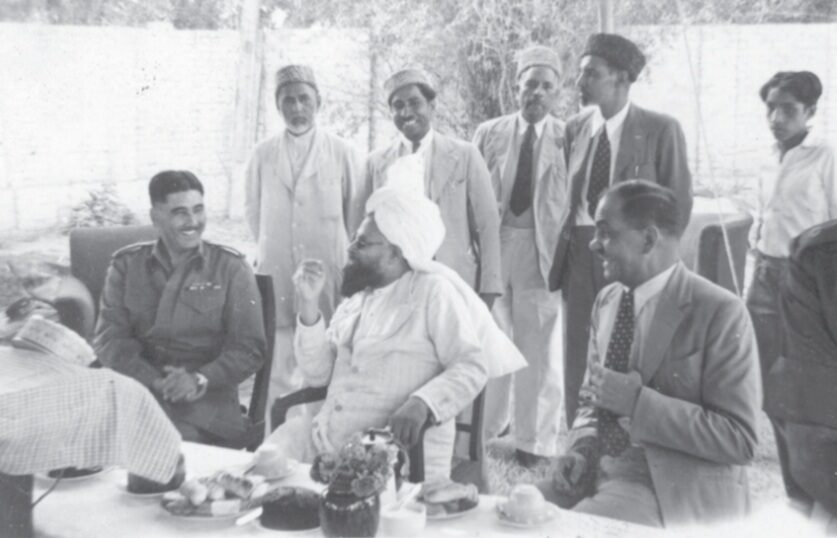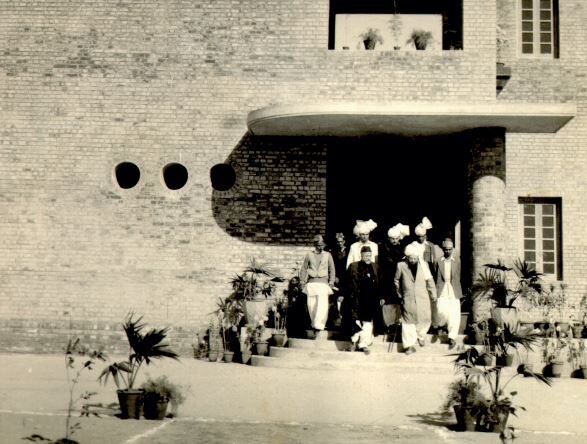Al Fazl, 14-17 November 1921

2 November 1921
Bai‘at
Mian Sangu Sahib, a resident of Basraun, District Gurdaspur, [performed bai‘at at the hand of Hazrat Khalifatul Masih IIra].
3 November 1921
Sign of the Mahdi
Maulvi Hafiz Ghulam Rasul Sahib Wazirabadi, who is a student of Hafiz Muhammad Sahib of Lakhu Ke, submitted, “One of the signs of the Mahdi that Hafiz Muhammad Sahib wrote in Ahwal-ul-Akhirah is:
بولن لگا اَڑ كر بولے پٹاں تے ہتھ مارے
[When he (the Promised Mahdi) would speak, he would slightly stammer and hit his thigh with his hand.]
“A person asked me [Maulvi Hafiz Ghulam Rasul Sahib Wazirabadi] if the said was found in the Promised Messiahas. I told him that the idiom of اَڑ كر بولنا is also used in Punjabi in the sense of calling a competitor in a battlefield and the Promised Messiahas had openly challenged his opponents and everyone knows that.”
Hazrat Khalifatul Masih [IIra] said:
“This is not only the case because the said thing was also found in the Promised Messiahas in the true sense of the words as well. When the Promised Messiahas used to speak with passion, sometimes there was a slight stammer in some words and at that time his hand would also fall on his thigh. This is the condition of our whole family that sometimes our words stammer while speaking passionately.”
When Maulana Sarwar Shah Sahib mentioned something, Huzoor[ra] said:
“Sometimes (ڑ) instead of (ر), for example, (انڑگ) would come out of the mouth of the Promised Messiahas instead of (گرنا).”
Torment and advent of Prophets
Addressing Hakim Ahmad Hussain Sahib Lyallpuri, Huzoor[ra] said, “Yesterday you wanted to ask some questions, what are they?” Hakim Sahib submitted, “It is mentioned in the Holy Quran:
وَ مَا كُنَّا مُعَذِّبِىۡنَ حَتّٰى نَبۡعَثَ رَسُوۡلًا
“[‘We never punish until We have sent a Messenger.’]
“This verse shows that a Prophet must come before a torment. Now the question arises that who was the prophet at that time of the torment that befell the Muslims in the time of Hulagu Khan?”
Hazrat Khalifatul Masih[ra] said:
“First of all, the question of what a torment is, needs to be answered. Thus, it should be understood that every kind of affliction which is sent by God is a torment. The word torment also carries the meaning of revenge. The meanings of torment also include that punishment which comes as a result of a crime. The number of people doesn’t matter, even if a single person is punished for his crime, it is a torment for him. Hence, if the meaning of this verse is that a prophet should come at the time of every torment, then the appearance of a prophet is compulsory before any person gets punishment. However, neither this meaning is rational, nor is it practically possible. Thus, it is clearly invalid.
“We observe that around 99 per cent of the people experience torments in one way or the other. In that case, it is necessary to have that many prophets as well, [which is impossible]. Therefore, we have to draw a line in the said meaning.
“As far as the torment to a nation is concerned, then this nationwide torment cannot come unless a prophet is first sent to that nation. For example, when the Prophets came to the Israelites, because of their denial, the torment would not come only to the members of one family, but it would come to the entire party to which the Prophet was sent because of their denial. That is, the scope of the torment would encompass the group for which the prophet was sent. For instance, the advent of a prophet was for all the Israelites, so if a particular family was tormented, there was no need for a prophet. Hence, if the prophet is sent for everyone, then the torment must come on the entire group.
“Now we look at the fact that the Holy Prophetsa is a messenger for all the nations and the prophet who will come after him will also be a prophet for the whole world in the form of his [the Holy Prophet’ssa] embodiment and reflection. After that, if the torment comes, it will come to the whole world. If the torment befalls a country or a nation, then it will come in the category of a family or an individual and there is no need for a prophet for that. If the torment is destined to come to the whole world, then a prophet will come first because now the prophet can only be sent for the whole world. The torment of Hulagu Khan’s time was limited to a particular circle. For instance, it came in Iraq and in another region. In comparison to the whole world, there was no need for another prophet after the Holy Prophetsa to come before that torment which befall that region. The status of that small area in comparison to the rest of the world in terms of the extent of the scope of the Prophet’s advent is the same as that of a family or an individual of the Israelites at the time when the prophets were sent to the Israelites. If such a delimitation is not made, then it must be admitted that a prophet should come before any person is punished.
“According to the said view, this is the age in which a prophet should have been sent, and in this age, as I said, the only person who can be a prophet is a prophet for the whole world. Today, we observe that the whole world is under torment. There is not one kind of suffering but torments of various kinds are befalling. There are political torments, social torments and the world is also suffering with respect to health. The torments that come from the laws of nature are rising. For example, earthquakes and diseases are spreading and that too on a global scale. If there is a plague, then it too has spread its wings everywhere and there are outbreaks of fevers. Hence, there is no limit to these epidemics, disasters and calamities.”
Hakim Sahib asked, “Was this the condition of the world in the time of the Holy Prophetsa as well?” Hazrat Khalifatul Masih said:
“Yes, the Holy Quran testifies:
ظَہَرَ الۡفَسَادُ فِى الۡبَرِّ وَ الۡبَحۡرِ
“[‘Corruption has appeared on land and sea’], i.e., there was worldwide torment.”
Hakim Sahib submitted that the Promised Messiahas had interpreted this verse as religious and spiritual downfall.
Huzoor[ra] said:
“That is also true, but even the apparent condition of the world was also bad. The Europeans say that the reason for the success of the Holy Prophetsa was that there was a need for a reformer at that time and the Holy Prophetsa just made a claim and the people accepted him.

The difference between forbidding something for yourself and saying something is haram [unlawful] for you
Hakim Sahib asked the second question, “At one place in the Holy Quran, [Allah the Almighty] said:
یٰۤاَیُّہَا النَّبِیُّ لِمَ تُحَرِّمُ مَاۤ اَحَلَّ اللّٰہُ لَکَ ۚ تَبۡتَغِیۡ مَرۡضَاتَ اَزۡوَاجِکَ
“‘O Prophet! why dost thou forbid thyself that which Allah has made lawful to thee. Thou seekest the pleasure of thy wives?’ (Surah al-Tahrim, Ch.66: V.2)
“And at another place, Allah the Almighty says:
وَ لَا تَقُوۡلُوۡا لِمَا تَصِفُ اَلۡسِنَتُکُمُ الۡکَذِبَ ہٰذَا حَلٰلٌ وَّ ہٰذَا حَرَامٌ
“‘And say not – because of the falsehood which your tongues utter – This is lawful, and this is unlawful.’ (Surah al-Nahl, Ch.16: V.117)
“In the presence of the latter verse, why did the Holy Prophetsa do contrary to it?”
Hazrat Khalifatul Masih said:
“Haram has two meanings. One is that something is haram according to the Shariah [divine law] and the other is that a person restrains himself from something.
“The Holy Prophetsa stopped eating honey because his wives did not like its smell. However, he did not forbid others. This is mentioned in the first verse. Something else is mentioned in the second verse. It forbids those who formulate their own Shariah and tell others that such and such things are haram and other things are halal [lawful]. However, God Almighty had not told them anything about it. Thus, the act of the Holy Prophetsa cannot come under the said prohibition. On the other hand, God Almighty did not even like the said action of the Holy Prophetsa and that he may carry on doing that. One may not eat anything for as long as he wants, but it is not right to forbid anything for yourself forever, as it is possible that due to certain reasons, it becomes necessary for him to eat that thing, but he would not be able to eat that thing because of the said commitment. Thus, He [God] said that such vows are not valid because the previous Shariah did not take into account the complete aspects of rationality and nature, but was in accordance to the need of the time. Now, the aspects of reason and nature have been perfected in the Shariah of Islam. Therefore, God Almighty did not even like that [the Holy Prophetsa forbade something for himself].”
Huzoor[ra] said:
“Whatever Prophet Jacobas had forbidden for himself was due to the fact that he was distressed by it, but the act of the Holy Prophetsa was based on morality because he did it out of concern for the suffering of others. However, God Almighty said that that too was not right.”
(Translated by Al Hakam from the original Urdu in the 14-17 November 1921 issue of Al Fazl)

